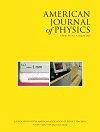在理想量子气体中作用在运动物体上的力
IF 0.9
4区 教育学
Q3 EDUCATION, SCIENTIFIC DISCIPLINES
引用次数: 0
摘要
我们考虑一个重的外部物体在轻粒子的理想气体中运动。与气体粒子的碰撞将动量传递给物体,从而产生与物体速度成正比但方向相反的力。在温度为T的理想经典气体中,作用在物体上的力与T成正比,量子统计导致T依赖关系的偏差,并表明力在低温下与T2成比例。在T = 0时,力在玻色气体中消失,而在费米气体中则有限。本文章由计算机程序翻译,如有差异,请以英文原文为准。
Force on a moving object in an ideal quantum gas
We consider a heavy external object moving in an ideal gas of light particles. Collisions with the gas particles transfer momentum to the object, leading to a force that is proportional to the object's velocity but in the opposite direction. In an ideal classical gas at temperature T, the force acting on the object is proportional to T. Quantum statistics causes a deviation from the T-dependence and shows that the force scales with T2 at low temperatures. At T = 0, the force vanishes in a Bose gas but is finite in a Fermi gas.
求助全文
通过发布文献求助,成功后即可免费获取论文全文。
去求助
来源期刊

American Journal of Physics
物理-物理:综合
CiteScore
1.80
自引率
11.10%
发文量
146
审稿时长
3 months
期刊介绍:
The mission of the American Journal of Physics (AJP) is to publish articles on the educational and cultural aspects of physics that are useful, interesting, and accessible to a diverse audience of physics students, educators, and researchers. Our audience generally reads outside their specialties to broaden their understanding of physics and to expand and enhance their pedagogical toolkits at the undergraduate and graduate levels.
 求助内容:
求助内容: 应助结果提醒方式:
应助结果提醒方式:


